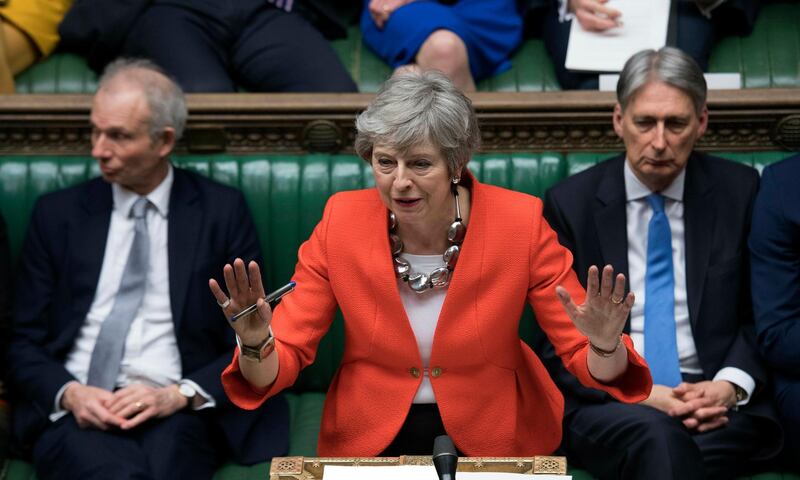Last week, the headlines were filled with surprise at the twists and turns being taken by Brexit.
The general theme was that reality had hit Westminster with a resounding thud. Even Donald Trump appeared shocked when he spoke of the capacity for division embedded in the UK’s departure from the European Union.
When one German writer suggested that the House of Commons was attracting a bigger audience than the Champions League clash between Liverpool and Bayern Munich on Wednesday, he highlighted a deep fascination across Europe with the process itself.
A correspondent for a Danish newspaper claimed the knife-edge votes in the parliament had taken over his life. As an emissary from the land that produced TV blockbusters such as Borgen (meaning parliament) it was a backhanded compliment to the drama being produced in Westminster.
While gripping, the democratic process has been unable to deliver Brexit. Politicians are very good at deciding what they do not want, less good at making their minds up about what they do, and the system is deadlocked on what the 2016 referendum result means.
This basic contradiction was confirmed to Prime Minister Theresa May late on Thursday. As she waited for the outcome of voting in the Commons, she was physically jolted as she learnt that, for once, the result had gone her way. She won by just two votes, beating a motion granting MPs – not the executive that she leads – control over the parliamentary timetable and thus the ability to dictate what happens next.
It is worth noting that the simple act of voting in the Commons is an arduous process. More than 600 MPs register their choice by walking through a corridor, then returning to the chamber. Each vote therefore takes at least 25 minutes. There are often amendments. Even amendments to amendments, which can extend proceedings for hours.
Earlier in the week, the Commons had voted to assert that Britain should not leave the EU without a withdrawal deal with Brussels. This decision came after the rejection of the agreement Mrs May had spent two years negotiating with the EU.
With a deadline of March 29 looming, a scramble is under way to avoid the chaos of a no-deal scenario.
The UK’s request to Brussels for more time to abrogate its membership of the EU is a consequence of crippling indecision.
As one observer put it: faced with the end of the road, parliament had decided to give itself more road.
Few countries would be as resilient as Britain has been in withstanding the real-world consequences of such immense political volatility.
There is undoubtedly more chaos to come. Europe could decide this week that its indulgence of Brexit is now exhausted.
Its leaders are divided. Some are willing to consider a technical period that would allow laws to be passed in order to smooth the departure. Others seek a longer postponement to leave open the possibility of cancelling the withdrawal altogether.
There were many facets to the events at Westminster last week. Not just the soap-opera qualities of the debates, to which much outside interest can be attributed, or even the impact on the country’s global reputation. Instead, there is now a pervasive sense that the dam has started to break.
Mrs May has relied on dogged perseverance to grind her way forward, despite innumerable setbacks.
It may be that Thursday will one day be seen as the turning point. Mrs May obtained permission for a delay in Brexit, while not losing control over what happens next.
It is a lifeline, but one with very limited shelf life.
Should MPs reverse course and back her deal when it is voted on for a third time on Tuesday, there will be one path open to Mrs May. European approval for a two or three-month delay would follow to smooth out the departure.
Anything else almost certainly means Mrs May’s career will be finished within days, or weeks at the outside. There is a very real danger she could fluff her lines at the Brussels summit and be sent packing into a hard Brexit at the end of the month.
A longer delay approved by Brussels in absence of a deal would strip her remaining in office of any logic. The Conservative party is likely to decide she is finished. A Brexit hardliner would succeed as prime minister, which would doom efforts to compromise with the Europeans on the orderly withdrawal.
Even if the internal push against Mrs May does not come, the parliamentary arithmetic points to a general election sooner rather than later.
The rickety alliance with the Northern Ireland Democratic Unionist Party, which holds the balance of power, has been tested to its limits by their rebellion on the withdrawal agreement.
Conservative defectors and malcontents are growing in number. The House of Commons is seething with resentments.
Almost everyone knows the end of the road looms for Brexit, Mrs May or both.





